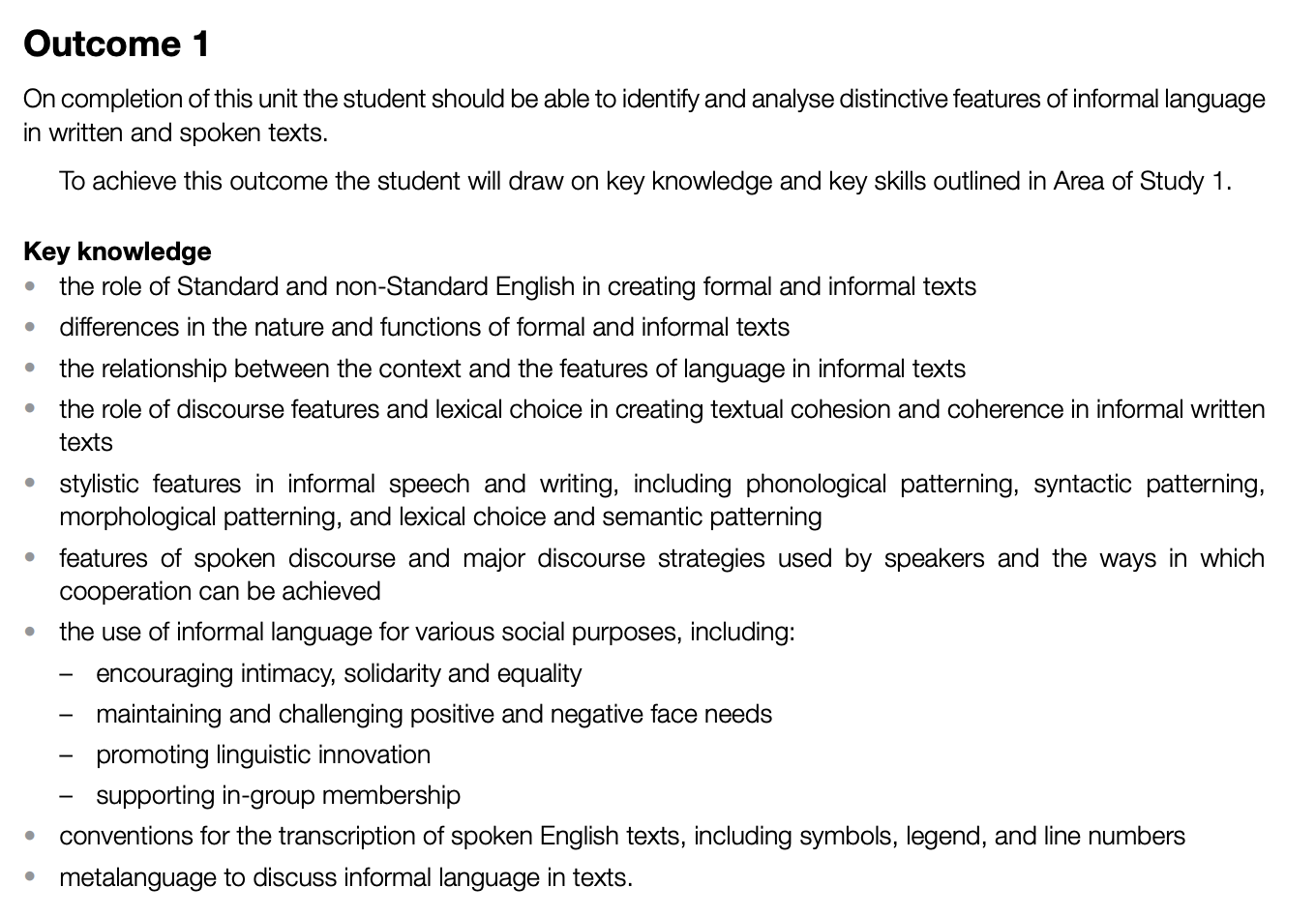There are sometimes occasions when you only have a few minutes to yourself, and you want to be productive, but you’re not sure how. You don’t have a lot of time up your sleeve, so you might not want to start a big task - and that’s totally understandable!
Here are seven quick study strategies you can try when you only have a very short period of time available to you to study.
Choose a dot point, and write
The good thing with subjects in upper high school is that they tend to come with a published syllabus. That is, a document containing everything you need to know for that subject. Typically, the syllabus will come in dot point form (broken up by areas or units of study), making it really easy to focus on one small part of the subject at a time.
For example, here is a section of the 2023 VCE English Language Units 3&4 study design, sourced from VCAA.

There is some really useful information here, and you can also see how clear it is what you need to know come the end of the year. One strategy is simply to take a single dot point - let’s say the role of Standard and non-Standard English in creating formal and informal texts - and write as much as you can about it in the time you have.
Your thoughts don’t need to be neat, and they don’t need to be logically ordered. Just write what you know.

What you might find is that, if you know your stuff, writing down your thoughts can help you reinforce information and make links. On the other hand, you might come up blank if you don’t know that area of the syllabus very well. And that’s okay - it’s a useful way of highlighting what you don’t know (and, therefore, what you might like to focus on next!).
Choose a dot point, and make connections
Something else you might like to do with the syllabus is try to make connections between different areas of content - particularly for humanities or other ‘content-heavy’ subjects.
Syllabus dot points don’t exist in isolation - they are very often linked to other aspects of the subject, and having a holistic understanding of these connections can pay dividends when it comes to longer-format questions in tests and exams.
Select a dot point on the syllabus, then scan other dot points to see what connections you can make. Does one impact the other? Is it a two-way relationship? Or are they entirely unrelated? Why might that be the case?
Revise with flashcards
Revising with flashcards is one of the most popular quick study techniques - and for good reason. With a set of quality flashcards for your subject, you can easily brush up on definitions and concepts. And because they’re compact, you can even take them on public transport or out and about!

If you’re making your own flashcards, there are a couple of things to consider. Firstly, you’ll need to make decisions about which areas of content to include, and how much content for each card. Make sure you refer to several different sources before creating the flashcards to ensure the information is correct. Secondly, it’s best to use high-quality materials for durability.
Perhaps the easier option is to use a set of pre-created flashcards, like the ATAR Notes Flashcards series. ATAR Notes Flashcards are state and subject-specific, meaning you know they are syllabus-aligned. They include succinct answers and colourful graphics designed to help you study and improve your marks.

Create your own questions
A useful strategy - particularly in the lead-up to exams - can be to try to get inside the mind of an assessor. If you were creating the exam questions for an area of the syllabus, what would you ask? How many marks would you assign, and why? What types of details would you be looking for in the solution or answer?
There are a couple of benefits to this strategy. Firstly, based on your experience of creating questions yourself, you might start thinking more strategically when you’re answering questions. If a question is worth four marks, for example, what level of detail would you need to display? Do you need to include your working out to show you truly understand the content?
Secondly, building your own question bank provides another avenue for study later in the year. If you have friends doing the same thing, you can even swap your prompts for more opportunities to think about the content and how to answer examination-style questions!

Smash out some maths problems
A lot of these strategies have focused on ‘content-heavy’ subjects, but if you study mathematics, you can always get stuck into some maths problems, even if you only have a few minutes available. One thing you might like to do is use the time as early exam revision - jump back to a topic from earlier in the year, select a random question, and make sure you still have the skills and knowledge required.
Watch subject content/strategy videos
Trawling through the textbook for information can get a bit much sometimes, so it’s good to remember that there are other ways available to consume information. Subject videos, such as these free ones, can help provide a different perspective or way of thinking about a topic - and some only run for a minute or two!
Speak your notes
Mix it up a little bit! If you invest some time to record yourself reading through some of your notes, you’ll have great little recording snippets to use as quick revision when travelling or between other tasks. Speak through your chapter summaries, save them as individual files, and then brush up on that information whenever you need.
The strategies outlined here are just a start - best of luck with your revision!




